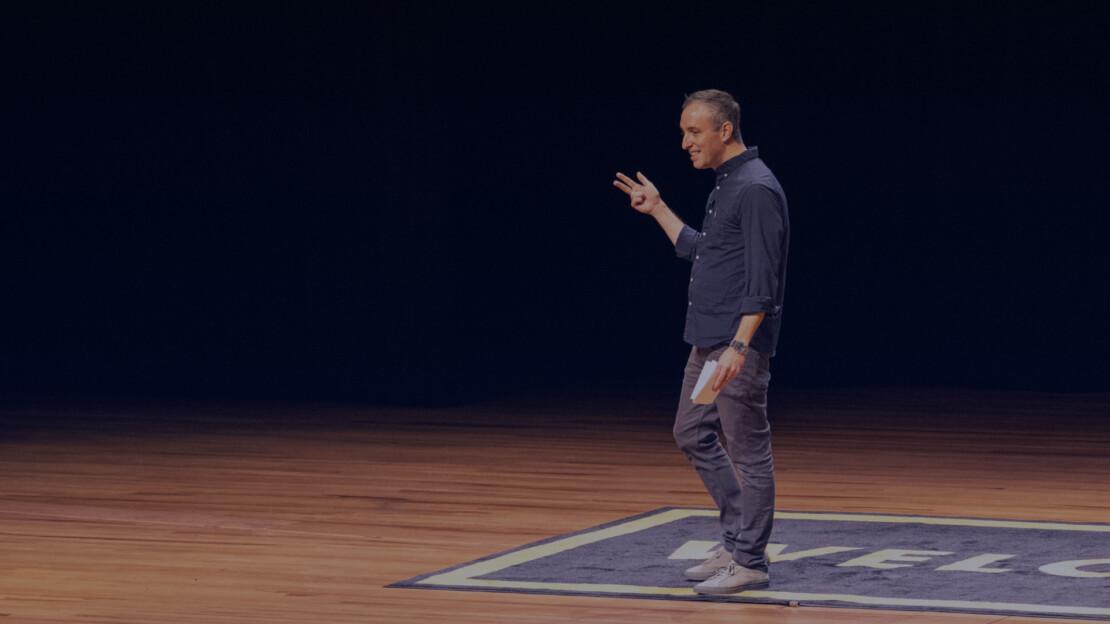23May2024
Will Guidara is a big name in the hospitality industry, known for his innovative take on creating unforgettable dining experiences. As the co-owner of the world-famous Eleven Madison Park in New York City, he’s racked up numerous awards, including several Michelin stars and the title of Best Restaurant in the World in 2017.
We had the honor to interview Will on his approach to customer experience and how to create cultures that embody hospitality. Through his thoughtful reflections and actionable tips during our chat, Will provided a down-to-earth guide to building a culture where care, passion, and excellence thrive.
“I believe that we are all in the business of serving other people. We just happen to sell them different things.”
Defining the Core of Customer Experience
Will’s core belief is that you should invest as much of yourself in how you make people feel as most successful people are investing in the product or service that they offer. “The underlying thesis is that we should all just care a little bit more and try a little bit harder to make people feel seen, to give them that sense of belonging,” he added.
He also referred to the famous quote by Maya Angelou: “People will forget what you say, they’ll forget what you do, but they’ll never forget how you made them feel.” Will believes that this is the one thing about human beings that many people aren’t getting right. When he founded his restaurant, he chose with his team to be as unreasonable in the pursuit of how they make people feel as most restaurants are of the food they are serving.
The Distinction Between Service and Hospitality
We couldn’t help but wonder if the product or service could in some cases be a part of the feeling and experience Will was describing. However, he argues that the service or product and the experience are separate.
The product needs to be good—that is the foundation of everything. Service is a part of the product, and the experience or hospitality is separate. For example, in a restaurant, good service is getting the right food to the right person at the right time. Hospitality is something more:
“Hospitality is the way you make someone feel through the service, the extent to which you engage with them on a human level. It’s the extent to which you’re willing to do whatever it takes to make sure that they feel a genuine sense of connection.”
Extending Hospitality Across Industries
As hospitality and the product are two separate things, it doesn’t matter whether you are a dentist, a pilot, or a salesperson. You can provide unbelievable hospitality no matter your profession—and you should. Your product must be excellent, but that excellence pales compared to the emotional connection you can forge with your customers.
Measuring the Return on Hospitality
Will brought up a reason why many companies neglect hospitality: “The return on investment in hospitality is harder to measure. The problem with most companies is that what gets measured gets managed.”
Companies find it easier to spend their budget on things that are easily trackable. It’s much more difficult to measure the ROI of money used for making your customers feel genuinely cared for. Therefore, Will argued that companies should change the way they approach investing. Not all budget decisions should be driven by data: “Sometimes we just need to be driven by our inner sense of what right looks like.”
“While it’s harder to calculate the return on people feeling appreciated, that doesn’t mean the return is not there.”
The Ultimate Form of Marketing
The case is often similar for marketing—efforts on building brand awareness and word-of-mouth can’t always be so straightforwardly measured. In fact, Will suggested that hospitality is much like marketing: “I actually think it’s the greatest form of marketing there is because if you give people stories to tell, guess what they’re going to do? They’re going to tell them over and over and over again.”
One day, you might end up with several brand ambassadors who swear by the name of your product, service, and the customer service you provide. They’re doing marketing on your behalf, perhaps even better than you could’ve done yourself.
Open the Doors for Innovation
Will argued that only focusing on what’s trackable also hinders innovation. Trying out something new implies that there is no existing system in place to track its performance. When companies only do things that show on their spreadsheets, they’re less likely to do something no one else has done before.
Creating a Culture of Hospitality
How do you start investing in hospitality and create a culture that supports it? Our discussion with Will led to several interesting topics that helped answer this question.
Everyone Needs to Be Involved
“Hospitality is a team sport,” Will began when we asked him how to leverage great customer experiences in different industries, “it doesn’t matter how hospitable any one individual on the team is; it requires the buy-in of the entire organization.”
Companies don’t often involve enough people in their hospitality efforts. In fact, every single person in an organization should be involved, no matter their position. Will pointed out that people at the top of the organization must be equally passionate about hospitality as the frontline workers for great customer experiences to come to life. Hospitality isn’t just something that is shown to customers—it needs to be shown within the organization by the people who make it.
“Hospitality is being creative and intentional in pursuit of relationships, and it will never be paid forward to the customer if it’s not felt by every single person on the team from every single person on the team.”
Empowering Employees
Too often companies have a small group of people on top making decisions about and designing the products and services. The rest are meant to merely follow the rules and bring that vision to life. Will claims that this isn’t a recipe for success. Instead, it’s essential to give the people on your team a sense of ownership of their work.
Will explained that it’s quite usual in many organizations that the people at the top have all the authority and the people on the front line have all the information. To do anything genuine and innovative, and to create a culture of hospitality, that gap needs to be bridged. The people on the front line closest to your customers must be empowered, have autonomy, and be able to make decisions in the moment to the benefit of your customers. Otherwise, you won’t be able to provide genuine hospitality.
“Empower the people on your front lines so that they can imbue the experience they’re serving with their own creativity and have the resources and the permission to react in the moment.”
Anyone Can Be Hospitable
But, is it possible to get everyone on board? That’s what we wondered.
“Is it possible to get every single person on the team on board? Yes. Is it likely? No,” was Will’s answer. He believes that everyone can be hospitable, and leaders play an important role in drawing hospitality out of the people in their team. Essentially, good leaders can bring out the best in their team, including hospitality: “What I’m saying is we all have it in us. Someone needs to get it out into the world and unclog the pipes, I guess you could say.”
Will added that it has a lot to do with how hospitality makes us feel, not only when we receive it. The feeling of seeing someone else happy and grateful due to something you did is powerful, and once you’ve felt it, you’ll want to do it again.
Navigating the Change
Changing a culture is always a challenge, and there are always people who don’t like it. Will told us about how to not approach making these cultural changes:
“If you’re a good salesperson, that’s dangerous because you can wake up one day and realize you’ve sold a bunch of people an idea that they don’t really believe in. And then five months later, they remember that they don’t believe in it, and then they leave, and you’re right back to where you started.”
Will believes that leaders are not meant to sell their teams a vision. Leaders are meant to explain where the company is going, set clear expectations, and invite the team to join. ‘Inviting’ is a key term here, as it implies that members of the team are allowed to disagree. This is both to find out who does not want to participate and to give the space to craft a shared vision.
“I think there’s a balance between having a very clear vision that people can get excited about or not, but leaving enough at the end that they can help you finish drawing the painting.”
What Gets Talked about, Gets Thought about
Unless the leaders in your organization are talking about hospitality consistently, it won’t sink into the organization. It’s important to clearly and consistently lay out the non-negotiables to your team, and add hospitality to that list.
Repetition is the mother of learning, so here is a quick overview of the main steps Will laid out for us to cultivate a culture of hospitality in your team:
- Step one: Make hospitality a priority—and talk about it.
- Step two: Empower people—so that they have not only the permission but also the resources to bring the idea to life.
- Step three: Show hospitality throughout the organization—involve everyone, and show hospitality not only to customers but to others in the organization.
- Step four: Do the whole thing again, over and over and over again.
Courageous Leadership
Last but not least, we wanted to know what Courageous Leadership means to Will. After all, he is one of our Nordic Business Forum 2024 keynote speakers.
“Courageous leadership means that you understand that your energy is meant to impact the people on your team, not the other way around.”
Will thinks that courageous leaders are those who show up to their teams with enthusiasm and passion about the things they care about. Courageous leaders don’t worry about caring too much or sounding cheesy—they believe in their ideas so much that they can become the spirit of the collective endeavor.
“I believe in creating a culture where it is cool to care, and that happens when a leader is courageous enough to not care what people think about them. In doing so, they get everyone to be just as passionate as they are about doing the right thing.”

 by:
by: 

